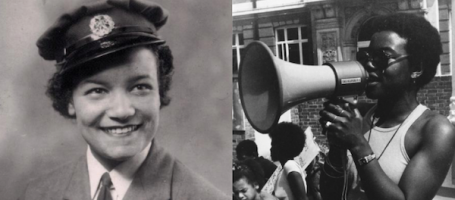THIS WEEK marks 100 years of women’s right to vote, a pivotal moment in British history which saw the start of women’s voices being heard on topics which affected them. Unfortunately, the voices of all women weren’t always heard and their faces not always seen.
The uncomfortable truth behind the suffragette movement is the exclusion of women of colour within it – something which still echoes today as discussions around white feminism versus black feminism remains a hot topic on social media platforms and various think pieces, alongside the ever-evolving debate about intersectional feminism.
There is hardly any evidence about black women’s involvement with the British suffragettes, or how they would have been treated had they wished to join the movement and the attitudes towards the emancipation of different races were complex to say the least. But what we do know is that black women’s contribution to British society as a whole remains key to the development of this very nation and is something we must celebrate.
So to mark the centenary of women’s suffrage, we also mark the unsung heroes – women who contributed largely to the growth of gender equality in the UK and breaking down barriers across medicine, politics, art and more.
1. Kathleen Wrasama

Born in Ethiopia, Kathleen Wrasama came to England as a child in 1917. During the 1930s, Wrasama moved to London and worked as an extra in films with Paul Robeson, and later established a Black seaman’s mission in Stepney with her husband. She was a founder member of the Stepney Coloured Peoples Association, an organisation committed to improving community relations, education and housing for black people.
2. Olive Morris

Olive Morris was a British community leader and activist in the feminist, black nationalist, and squatters’ rights campaigns of the 1970s. She campaigned for the rights of black people in South London and Manchester, and was a founding member of the Organisation of Women of African and Asian Descent (OWAAD) and the Brixton Black Women’s Group.
3. Connie Mark

Connie Mark, MBE, a Jamaican medical secretary who served in the Auxiliary Territorial Service after World War II, was a driving force within the black community, raising awareness of the contribution women made to the war effort. She also became Chair of the Friends of Mary Seattle organisation and a member of the West Indian Ex-Servicemen and Women’s Association and of the West Indian Standing Conference.
4. Fanny Eaton

Fanny Eaton was a Jamaican-born model, know for her work as a model for the Pre-Raphaelite Brotherhood and their circle between 1859–67. She moved to London from Jamaica and worked at the Royal Academy where one of the artists – Dante Gabriel Rossetti – praised her beauty. During a time where black people weren’t perceived as beautiful and featured in such imagery, Eaton challenged this notion and stands as an important figure in the history of art.
5. Diane Abbott

Diane Abbott has defied the odds since the 1970s and continues to do so as the longest standing black female MP and first black female MP in Parliament. Born in London to Jamaican parents, Abbott was educated at Harrow County Girls’ Grammar School and Newnham College, M.A.Hons. History, Cambridge University.
In 1976, she began a graduate trainee scheme at the Home Office, and in 1987, Abbott was the first black woman to become an MP. Last year marked the 30th anniversary of her election to her Hackney seat, and the inspirational figure continues to fight against sexual and racial discrimination.
6. Lilian Bader

Lilian Bader was born in 1918 in Liverpool and went on to become one of the first black women to join the British Armed Forces. The inspirational figure started out as a canteen assistant and eventually trained as an instrument repairer. She later became a leading aircraftwoman, earning herself the rank of Corporal.
7. Margaret Busby

Margaret Busby is an extremely admirable figure in the British publishing industry, as she became the youngest and first black female book publisher in 1967. The Ghanaian-born publisher, editor, writer and broadcaster co-founded Allison & Busby in 1967, which published the works of many writers, including up and coming black writers.
She also continuously campaigns for diversity within the publishing industry and in the 1980s, was a founding member of the Greater Access to Publishing (GAP), which works to increase the representation of black writers in British publishing.
8. Mary Seacole

Mary Seacole was a key figure during the Crimean War for her medical efforts in helping wounded soldiers. The British-Jamaican business woman and nurse set up the British Hotel behind the lines during the Crimean War, where she nursed the sick, provided food, shelter and more, resulting in soldiers calling her ‘Mother Seacole’.


Comments Form